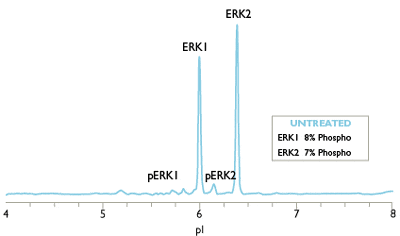Simple Western Charge Separation

Charge Separation Assays
The Simple Western Charge Separation assay is an automated immunoassay that doesn’t require the use of gels, transfer devices, blots, film or manual analysis of a traditional IEF Western blot. Instead, the Simple Western Charge Separation assay uses capillary isoelectric focusing to provide enhanced sensitivity and exquisite resolution for nearly all protein charge variants. Thanks to the high resolution of capillary isoelectric focusing, you'll be able to see extremely small differences in protein charge heterogeneity to resolve post translational-modifications that impact protein charge, such as phosphorylation and glycosylation. It's a new way of looking at discrete protein charge heterogeneity in very small samples that provide a wealth of information!
How Charge Separation Works
Simple Western Charge Separation assays take place in a capillary. Samples are prepared in ampholytes and loaded into an assay plate with reagents and antibodies. Then, plate is placed in a Simple Western Charge Separation instrument like Peggy Sue™ or NanoPro™ 1000, which automate the rest of the Simple Western Charge Separation assay. Peggy Sue and NanoPro 1000 use capillary isoelectric focusing to separate by protein charge (according to their pI), which provides higher resolution protein charge separation compared to traditional IEF Western blot. Then, the separated proteins are immobilized to the capillary wall via a proprietary, photoactivated capture chemistry. Target proteins are identified using a primary antibody and detected using an HRP-conjugated secondary antibody and chemiluminescent substrate. The resulting chemiluminescent signal is detected and quantitated.
Simple Western Charge Separation Data
Simple Western Charge data is processed automatically in Compass for Simple Western software. Sample data is displayed as an electropherogram where it's easier to see minute changes. Quantitative results such as pI value, signal intensity (area), % area, and signal-to-noise for each immunodetected protein are presented in the results table automatically.

From Your Peers Using Simple Western Charge Separation
“The Simple Western Charge assay, a capillary isoelectric focusing immunoassay, exceeded the reliability of 2D Western blots for resolving recombinant PKG-Iα and PKG-Iβ and uses 100,000X less sample quantity, making it well-suited for clinical disease proteomics because protein isoforms and post-translational modifications can be detected in precious tissue biopsies.”
- Mary G. Johlfs, M.S., Director of Research Operations/Scientist, Roseman University of Health Sciences

Charge Your Research with Simple Western
The ability to detect and quantify nearly all protein isoforms with high sensitivity and resolution makes Simple Western Charge Separation a uniquely powerful method for studying cell signaling networks, cancer, among many
other applications.
This eBook provides protocols for the analysis of more than 30 proteins by Simple Western Charge Separation, including common components of signaling pathways, enzymes, membrane proteins, and more.

Enabling Cutting Edge Biomedical Research
Characterizing the charge heterogeneity of biomolecules can provide profound insight into biological processes. For example, a protein’s charge heterogeneity will change in response to post-translational modifications like phosphorylation, and these changes may not be readily detectable by size-based assays like the traditional Western blot or even IEF Western blot.
Simple Western Charge Separation assays have been used extensively in biomedical research, where charge heterogeneity fingerprints created by the resolving power of Simple Western's capillary isoelectric focusing immunoassay technology are used to study topics related to cancer, neurological disease, diabetes and more.

Detailed Mapping of Signaling Cascades
Learn how researchers at Manchester University have developed assays encompassing clinical samples from Chronic Myeloid Leukaemia (CML-SC), Chronic Lymphocytic Leukaemia (CLL), Non-Small Cell Lung Cancer (NSCLC; tissue & plasma) and Endometrial Cancer using the Simple Western Charge Separation assay. This work defines the utility of the Simple Western Charge Separation assay in detailed mapping of signaling cascades in model systems and cellular organelles which would be challenging to obtain by IEF Western blot.
